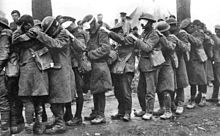日內瓦議定書
禁止在國際衝突中使用生化武器的公約
《禁止在戰爭中使用窒息性、毒性或其他氣體和細菌作戰方法的議定書》(法語:Protocole concernant la prohibition d'emploi à la guerre de gaz asphyxiants, toxiques ou similaires et de moyens bactériologiques; 英語:Protocol for the Prohibition of the Use in War of Asphyxiating, Poisonous or other Gases, and of Bacteriological Methods of Warfare),簡稱《日内瓦议定书》(法語:Protocole de Genève; 英語:Geneva Protocol),各締約國同意在戰爭中不使用窒息性、毒性或其他氣體,以及使用一切類似的液體、物體或器件,即化學武器與生物武器[3]。締約國於1925年6月17日在瑞士日內瓦簽署了該協議,於1928年2月8日開始生效。
| 禁止在戰爭中使用窒息性、毒性或其他氣體和細菌作戰方法的議定書 | |
|---|---|
| 起草完成日 | 1925年6月17日[1] |
| 簽署日 | 1925年6月17日[1] |
| 簽署地點 | 日內瓦[1] |
| 生效日 | 1928年2月8日[1] |
| 生效條件 | 65國批准[2] |
| 簽署者 | 38[1] |
| 締約方 | 146[1] |
| 保存處 | 法國政府[1] |
| 收錄於维基文库的條約原文 | |

無保留條款的締約國
已撤回保留的締約國
默示保留的締約國
未撤回保留而限制議定書條款適用性的締約國
非締約國
| 您可以在維基文庫中查找此百科條目的相關原始文獻: |

日内瓦议定书的締約國有140個。[4]
禁止生化武器的國際法文件 编辑
| 年份 | 名稱 | 效果 |
|---|---|---|
| 1675 | 斯特拉斯堡協定 | 歷史上首件限制使用化學武器的國際協議 |
| 1874 | 布魯塞爾戰爭法和慣例公約 | 禁止使用毒藥與毒性武器(該約未生效) |
| 1899 | 1899年海牙第2宣言 | 摒棄使用旨在散佈窒息性或毒性氣體的彈藥 |
| 1907 | 1907年海牙第4公約 | 增訂禁止使用毒藥與毒性武器 |
| 1919 | 凡尔赛条约 | 禁止德國使用毒氣 |
| 1922 | 戰爭中使用潛艇和毒氣條約 | 因法國反對有關潛艇戰的條款而失敗 |
| 1925 | 日內瓦議定書 | 禁止在國際衝突中使用窒息性、毒性的氣體、液體、材料或裝置,以及細菌戰。 |
| 1972 | 禁止生物武器公約 | 首件國際生物武器裁軍條約,但無核查機制;後續議定書於2001年談判失敗 |
| 1993 | 禁止化学武器公约 | 全面禁止化學武器的開發、生產、儲存和使用,並規定銷毀期限 |
| 1998 | 国际刑事法院罗马规约 | 在國際衝突中使用化學武器明定為戰爭罪;2010年修正案擴大禁止範圍含各國內戰 |
參考文獻 编辑
- ^ 1.0 1.1 1.2 1.3 1.4 1.5 1.6 Protocol for the Prohibition of the Use in War of Asphyxiating, Poisonous or Other Gases, and of Bacteriological Methods of Warfare. 瑞士日內瓦: 聯合國裁軍事務廳. [2023-12-18]. (原始内容存档于2023-09-28) (英语).
- ^ Chemical Weapons Convention, Article 21 (页面存档备份,存于互联网档案馆).
- ^ 禁止在戰爭中使用窒息性、毒性或其他氣體和細菌作戰方法的議定書. 日內瓦. 1925年6月17日 [2015年7月27日]. (原始内容存档于2018年6月19日).
- ^ Protocol for the Prohibition of the Use in War of Asphyxiating, Poisonous or Other Gases, and of Bacteriological Methods of Warfare. [2018-12-18]. (原始内容存档于2019-05-21).